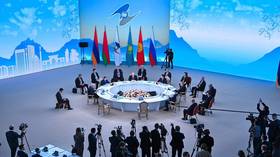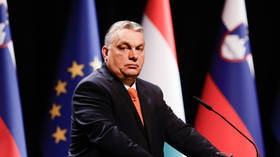Russia’s neighboring states experiencing economic boom – EDB

Economies within the Eurasian Economic Union (EAEU) have been growing rapidly, boosted by Ukraine-related Western sanctions and soaring demand, with their collective GDP exceeding 4% this year, according to the Eurasian Development Bank (EDB).
In its latest macroeconomic forecast for 2025-2027 on Thursday, the cumulative GDP of the five-nation economic bloc comprising Russia, Kazakhstan, Belarus, Armenia, and Kyrgyzstan will grow by 4.2% in 2024, outpacing the global average of 3.2%. The report also included Tajikistan, which is not an EAEU member.
Despite an increasingly complex and challenging global environment, members of the Russia-led economic bloc and countries in Central Asia have demonstrated resilience, the EDB said. The current year also marked the best performance for Eurasian nations since 2012, excluding a period of a post-pandemic recovery, the bank added.
The region’s nominal GDP is expected to surpass $500 billion in 2024, according to EDB Chief Economist Evgeny Vinokurov. Central Asia’s population, which has grown by more than 3% over the past two years to reach 80 million, presents a “demographic window of opportunity” that could fuel economic growth for the next 15 to 20 years, he said.
“The Central Asian economy has become a major player. It is attractive for investment, a dynamic sales market, and strategically significant for transport and transit potential,” said Vinokurov.
It comes at a time when the global economy is facing a slowdown due to lower productivity, weakening demand, and declining population, the EDB noted.
The Russian and Belarusian economies will continue to grow by 2.4% and 2.6% respectively in 2025, it said. The financial institution also expects GDP in Armenia and Kazakhstan to grow by 5.5%, in Kyrgyzstan by 8.7%, and in Tajikistan by 8.4%, driven by industrial activity and investments.
Russia has stepped up efforts to expand trade and other facets of economic cooperation with allied nations as it faces unprecedented Western sanctions. The country has also been actively switching trade from dollars and euro to national currencies with the EAEU members and other partners in the region.













